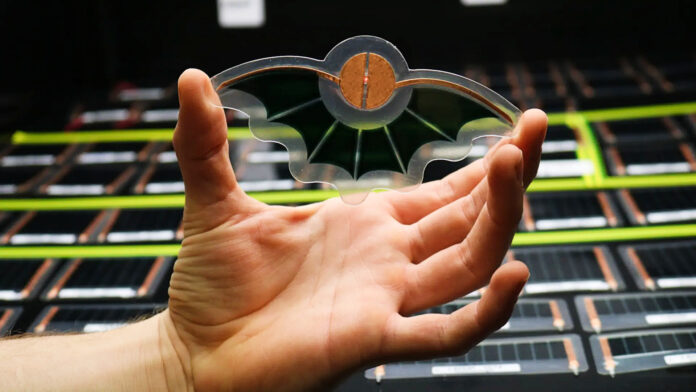France-based startup Dracula Technologies, offering low-light energy-harvesting solutions for passive (battery-less) LoRaWAN-based IoT connectivity, has confirmed its new smart factory will start “high-volume” production in “early 2024”. The new 2,500 metre-square facility, in Valence in southeastern France, is to be fully automated, with capacity to produce up to “150 million square centimetres” of organic photovoltaic (OPV) devices per year.
As trailed in RCR Wireless last month, Dracula Technologies has already developed a prototype tracker that runs on an OPV solar cell – which can be printed in any size, depending on the required power output, onto an 0.3mm adhesive sticker on a regular inkjet printer using special OPV ink. The OPV unit – which uses a reference LoRaWAN module from Semtech and a cloud stack from TTI – works in low light in dark rooms.
OPV technology draws power in the murkiest conditions, such as in warehouses or (“lights-out”) factories, where the luminous flux per unit area (lux), which measures illuminance, goes as low as 500. As a frame of reference, outdoor light registers at closer to 10,000 lux. “Five hundred lux is where it gets challenging,” the company told The Things Conference in Amsterdam last month. “A [passive]… sensor has to be able to work in low-light conditions.”
The square-centimetre production capacity (150 million units), quoted at the top, refers to the sheet production of OPV cells, in the form of “free-shaped” LAYER-branded OPV modules, which can be issued on inkjet printers – to “lower costs and increase customization”, and also reduce unit production costs “by a factor of three”.
The firm said it is pitching to” high-volume IoT customers” from 2024 , it said. The facility, dubbed the ‘Green MicroPower Factory’, is the largest of its kind in Europe, it said. It stated: “The new factory arrives at a critical juncture, coinciding with European regulation… to phase out non-rechargeable batteries in IoT. [It] enables large scale production of sustainable modules, marking the beginning of the end of conventional batteries.”
The company is preparing to licence its technology. It will also hire 60 staff at the site, on the road to employ 250 staff by 2030. About 78 million batteries from battery-powered IoT devices will be dumped globally every day by 2025, warns EU academic research. Dracula Technologies also pointed to its goal to bolster EU manufacturing – by “eliminating the need to import batteries from outside of Europe and working exclusively with European suppliers”.
It stated: “Not only are traditional batteries toxic to our environment, but their limited lifetimes also render them useless for industrial-grade IoT applications.” The company has been awarded €5 million by the French government, as a ‘laureate’ in its ‘First Factory’ project call, part of the France 2030 reindustrialization strategy. It has capital funding of €25 million from “strategic investors” like Semtech and from “financial investors” like BPI in France.
Brice Cruchon, chief executive at Dracula Technologies, said: “This new factory significantly expands our production capacity, ensuring we meet the growing demands of our customers by delivering customised solutions in high volume. We are excited to be leading the way to a greener and more connected future.”

